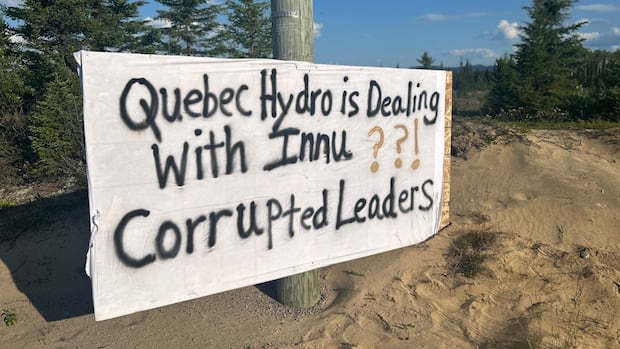[

Hydro-Québec says it’s suspending geotechnical work at Gull Island after members of Labrador’s Innu community blocked the area Wednesday evening.
In a statement in French to Radio-Canada on Thursday morning, the company said it respects the right of community members to express their concerns with the project and that it recognizes the cultural, historical, and spiritual importance of the Gull Island territory for the Innu communities.
“We are monitoring this situation closely, with openness and a full commitment to better understanding the protesters’ concerns,” wrote Hydro-Québec spokesperson Lynn St-Laurent.
About 20 protesters gathered in the area Wednesday evening, blocking roads to the site where Hydro-Québec hopes to build a new hydroelectric project — in partnership with Newfoundland and Labrador Hydro — on the lower Churchill River.
One protester told CBC News they plan to stay there through Thursday.
The Innu of Labrador reached an agreement in principle with Hydro-Québec in June. The agreement would see the company pay $87 million to a reconciliation fund for Sheshatshiu Innu First Nation and Mushuau Innu First Nation in annual payments over 16 years.
But the land is traditionally used for the Manishan Nui gathering, which brings the community together annually during the third week of September.
Around 20 Innu protested at the road leading to Gull Island on Wednesday, the proposed development site for a new hydroelectric project. They’re calling on leaders to stand against the project. Hydro-Quebec has since announced that geotechnical work on site will be suspended. Before that announcement, Sheshatshiu resident Chris Dyke shared his concerns over the project with the CBC’s Andrea McGuire.
On Tuesday the company said workers would be on the ground to collect environmental data, complete surveys and install construction trailers as part of geotechnical and environmental studies. Surveying the land would include some drilling and tree clearing.
The study is expected to cost between $10 and $15 million, and a staff of between 10 and 40 people was expected to be on the ground until late September to mid-October
Chris Dyke, who was a part of the barricade Wednesday evening, told CBC News the loss of those grounds is not worth the money.
“The gathering site is to bring people together, not to destroy it,” he said. “Everybody loves money. I love money, too, but it’s only a couple days worth of money you’re going to have here.”
Betty Sillitt, another protester, said members of the Innu community want to meet with Hydro-Québec to discuss how much money has gone to Innu Nation leadership.
“This is the only way it could be resolved,” she wrote in a text message to CBC News on Thursday afternoon.
St-Laurent said the company will “continue the dialogue we have initiated with community representatives to better understand their concerns and discuss next steps in a spirit of mutual respect.”
Download our free CBC News app to sign up for push alerts for CBC Newfoundland and Labrador. Sign up for our daily headlines newsletter here. Click here to visit our landing page

